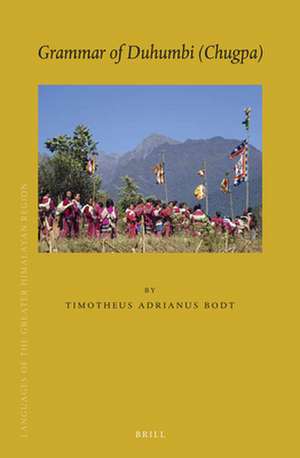Grammar of Duhumbi (Chugpa): Brill's Tibetan Studies Library / Languages of the Greater Himalayan Region, cartea 23
Autor Timotheus Adrianus Bodten Limba Engleză Hardback – 22 ian 2020
Duhumbi is spoken by 600 people in the Chug valley in West Kameng district, Arunachal Pradesh, India. The Duhumbi people, known to the outside world as Chugpa or Chug Monpa, belong to the Monpa Scheduled Tribe. Despite that affiliation, Duhumbi is not intelligible to speakers of any of the other Monpa languages except Khispi (Lishpa).
The volume Grammar of Duhumbi (Chugpa) describes all aspects of the language, including phonology, morphology, lexicon, syntax and discourse. Moreover, it also contains links to additional resources freely accessible on-line.
Din seria Brill's Tibetan Studies Library / Languages of the Greater Himalayan Region
- 18%
 Preț: 1032.15 lei
Preț: 1032.15 lei - 18%
 Preț: 1089.39 lei
Preț: 1089.39 lei - 18%
 Preț: 749.20 lei
Preț: 749.20 lei - 18%
 Preț: 637.49 lei
Preț: 637.49 lei - 18%
 Preț: 567.33 lei
Preț: 567.33 lei - 18%
 Preț: 1247.14 lei
Preț: 1247.14 lei - 18%
 Preț: 946.29 lei
Preț: 946.29 lei - 18%
 Preț: 1032.55 lei
Preț: 1032.55 lei - 18%
 Preț: 1218.49 lei
Preț: 1218.49 lei - 37%
 Preț: 643.55 lei
Preț: 643.55 lei - 18%
 Preț: 1510.70 lei
Preț: 1510.70 lei - 18%
 Preț: 835.10 lei
Preț: 835.10 lei - 18%
 Preț: 1655.85 lei
Preț: 1655.85 lei - 18%
 Preț: 722.93 lei
Preț: 722.93 lei - 18%
 Preț: 1176.79 lei
Preț: 1176.79 lei - 18%
 Preț: 790.92 lei
Preț: 790.92 lei - 18%
 Preț: 672.59 lei
Preț: 672.59 lei - 18%
 Preț: 682.68 lei
Preț: 682.68 lei - 18%
 Preț: 1114.69 lei
Preț: 1114.69 lei - 18%
 Preț: 648.88 lei
Preț: 648.88 lei - 18%
 Preț: 1267.57 lei
Preț: 1267.57 lei - 18%
 Preț: 743.07 lei
Preț: 743.07 lei
Preț: 1095.49 lei
Preț vechi: 1335.96 lei
-18% Nou
Puncte Express: 1643
Preț estimativ în valută:
209.66€ • 218.31$ • 177.18£
209.66€ • 218.31$ • 177.18£
Carte indisponibilă temporar
Doresc să fiu notificat când acest titlu va fi disponibil:
Se trimite...
Preluare comenzi: 021 569.72.76
Specificații
ISBN-13: 9789004409477
ISBN-10: 9004409475
Dimensiuni: 155 x 235 mm
Greutate: 1.36 kg
Editura: Brill
Colecția Brill
Seria Brill's Tibetan Studies Library / Languages of the Greater Himalayan Region
ISBN-10: 9004409475
Dimensiuni: 155 x 235 mm
Greutate: 1.36 kg
Editura: Brill
Colecția Brill
Seria Brill's Tibetan Studies Library / Languages of the Greater Himalayan Region
Cuprins
PrefaceAcknowledgementsList of tablesList of Glosses, conventions and symbols
1 The Duhumbi and their language1.1Geographical setting1.2Geopolitical setting1.3Autonyms, exonyms and population1.4Origin and settlement1.5Livelihood, culture and religion1.6Duhumbi ngak1.7The data and corpus
2 Phonology and orthography2.1Transcription systems and orthographies2.2Non-native and marginal phonemes and allophones2.3The vowel system2.4The consonant system2.5Syllable structure and phonotactics2.6Prosodic features of Duhumbi2.7Two-way contrast on plosives and affricates
3 Parts of speech3.1Nominal versus verbal parts of speech3.2Pronouns3.3Nouns3.4Proper nouns3.5Adjectives3.6Demonstratives3.7Numerals3.8Postpositions3.9Adverbs3.10Expressives3.11Interrogatives3.12Verbal parts of speech3.13Other parts of speech
4 Lexical aspects4.1Nouns4.2Proper nouns4.3Adjectives4.4Adverbs4.5Expressives4.6Numerals4.7Lexical registers4.8Complex predicates4.9Particular verbs4.10Interjections4.11The borrowed lexicon
5 Nominalisations5.1Pure derivational nominalisers5.2Nominaliser -ba nom5.3Nominaliser -baʔ inf
6 The noun phrase6.1Constituent order in noun phrases6.2Grammatical relations and case markers6.3Other nominal suffixes6.4Intensity6.5Use of adjectives6.6Use of demonstratives6.7Use of the numeral hin ‘one’6.8Use of the postposition naŋ- ‘in’6.9Use of interrogatives
7 Verbal morphology7.1Imperfective -da ipfv7.2Past tenses7.3Non-past tenses7.4Summary of verbal morphology
8 Non-verbal predicates8.1Verb and copula-less clauses8.2Copula beʔ cop.ex8.3Copula le cop.le8.4Copula giʨʰa cop.eq8.5Copula ɕi cop.as8.6Copula in possessive relations8.7Copular verb ʥu- ‘be’8.8Negative copular verbs and copula balaŋ8.9Limited conjugational flexibility of copular verbs
9 Serial verb constructions9.1Types of SVC9.2SVCs in various contexts9.3SVCs and prosody9.4Modifying verbs9.5Symmetrical SVCs9.6Asymmetrical SVCs9.7SVCs in a historical-comparative perspective
10 Non-declarative clause types10.1Interrogatives10.2Question markers10.3Formation of questions10.4Question sub-types10.5Moods
11 Complex sentences11.1Imperfective phrases and clauses11.2Subordination with -ba nom and -baʔ inf11.3Subordination with -tʰaŋ lcn11.4Other cotemporal subordinators11.5Conditional with -se cond11.6Copular causal subordination11.7Conjunctions11.8Modifying suffixes and clitics
12 Discourse structure12.1Discourse structuring12.2Discourse particles12.3Topic, focus and emphasis
13 Texts13.1Duhumbi text genres13.2Metadata of texts13.3Metadata of speakers13.4Descriptions of all texts13.5Zenodo DOIs of texts13.6Elicitation files13.7Text: NNK; CHUK260413A2A13.8Text LGT; CHUK300412J213.9Text: LEL; CHUKx13A613.10Text: DTPK; CHUK131014
ReferencesIndexFigures
1 The Duhumbi and their language1.1Geographical setting1.2Geopolitical setting1.3Autonyms, exonyms and population1.4Origin and settlement1.5Livelihood, culture and religion1.6Duhumbi ngak1.7The data and corpus
2 Phonology and orthography2.1Transcription systems and orthographies2.2Non-native and marginal phonemes and allophones2.3The vowel system2.4The consonant system2.5Syllable structure and phonotactics2.6Prosodic features of Duhumbi2.7Two-way contrast on plosives and affricates
3 Parts of speech3.1Nominal versus verbal parts of speech3.2Pronouns3.3Nouns3.4Proper nouns3.5Adjectives3.6Demonstratives3.7Numerals3.8Postpositions3.9Adverbs3.10Expressives3.11Interrogatives3.12Verbal parts of speech3.13Other parts of speech
4 Lexical aspects4.1Nouns4.2Proper nouns4.3Adjectives4.4Adverbs4.5Expressives4.6Numerals4.7Lexical registers4.8Complex predicates4.9Particular verbs4.10Interjections4.11The borrowed lexicon
5 Nominalisations5.1Pure derivational nominalisers5.2Nominaliser -ba nom5.3Nominaliser -baʔ inf
6 The noun phrase6.1Constituent order in noun phrases6.2Grammatical relations and case markers6.3Other nominal suffixes6.4Intensity6.5Use of adjectives6.6Use of demonstratives6.7Use of the numeral hin ‘one’6.8Use of the postposition naŋ- ‘in’6.9Use of interrogatives
7 Verbal morphology7.1Imperfective -da ipfv7.2Past tenses7.3Non-past tenses7.4Summary of verbal morphology
8 Non-verbal predicates8.1Verb and copula-less clauses8.2Copula beʔ cop.ex8.3Copula le cop.le8.4Copula giʨʰa cop.eq8.5Copula ɕi cop.as8.6Copula in possessive relations8.7Copular verb ʥu- ‘be’8.8Negative copular verbs and copula balaŋ8.9Limited conjugational flexibility of copular verbs
9 Serial verb constructions9.1Types of SVC9.2SVCs in various contexts9.3SVCs and prosody9.4Modifying verbs9.5Symmetrical SVCs9.6Asymmetrical SVCs9.7SVCs in a historical-comparative perspective
10 Non-declarative clause types10.1Interrogatives10.2Question markers10.3Formation of questions10.4Question sub-types10.5Moods
11 Complex sentences11.1Imperfective phrases and clauses11.2Subordination with -ba nom and -baʔ inf11.3Subordination with -tʰaŋ lcn11.4Other cotemporal subordinators11.5Conditional with -se cond11.6Copular causal subordination11.7Conjunctions11.8Modifying suffixes and clitics
12 Discourse structure12.1Discourse structuring12.2Discourse particles12.3Topic, focus and emphasis
13 Texts13.1Duhumbi text genres13.2Metadata of texts13.3Metadata of speakers13.4Descriptions of all texts13.5Zenodo DOIs of texts13.6Elicitation files13.7Text: NNK; CHUK260413A2A13.8Text LGT; CHUK300412J213.9Text: LEL; CHUKx13A613.10Text: DTPK; CHUK131014
ReferencesIndexFigures
Notă biografică
Timotheus Adrianus Bodt, Ph.D. (2017), University of Bern, is currently affiliated as associate researcher (postdoc) to the School of Oriental and African Studies, University of London. He has published two monographs and several journal articles focusing on the linguistic, ethnographic and historical background of the Tibet-Bhutan-India borderlands.
